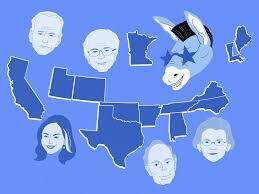Today’s college students are known to be politically opinionated and involved. Student-run political and social issue-based organizations are commonplaces on most college campuses, and student participation at political events, including climate strikes, women’s marches, protests, and candidate rallies seems to be higher than ever.
Bernie Sanders pins, shirts and stickers were a frequent sight on campus at Sonoma State during the week of Super Tuesday, as countless students seemed enthusiastic to share their political views. A sold-out event at the Green Music Center held on Super Tuesday featured human rights activist Angela Davis, who received multiple standing ovations and deafening cheers as she encouraged the crowd to involve themselves in political issues. Yet despite all of this, the overwhelming margin spike in voters since the 2016 election, it is still not enough for the generation to majority of college students failed to vote on Super Tuesday.
Data collected by the Center for Information and Research on Civic Learning and Engagement showed that Minnesota and Massachusetts had the highest youth voter turnout with just 19% of youth participating- California came in at 17.5%. Tennessee, the lowest-ranking state for youth participation, barely reached 5%. The National average for voter participation among the general public is 33.5%, meaning that older generations- particularly baby boomers- have a far greater say in American politics.
Bernie Sanders earned an average of 58.8% of the youth vote in nine of these states, with Joe Biden coming in at just 17.4%. But because youth turned out in such small numbers, Biden dominated. Despite the popularized adoration and outspoken support that students showed for Sanders, they failed to show up when their support mattered most.
There are a number of factors as to why college students do not turn out for elections. Failing to register in time is one of the most common reasons- because students often have overwhelming, chaotic and inconsistent schedules. Many students also report feeling overwhelmed at having to decide between candidates, and feel too uninformed to make an educated vote choice. Students may also struggle with receiving their mail-in ballots, as many are still registered to vote in their hometowns and may not yet have a permanent address to register in their new county.
Voter suppression is an issue in many conservative states, with stringent voter ID laws and the closure of many polling sites leading to excessive commutes and longer lines putting a dent in student votership. The New York Times reported that Texas closed six campus polling places at colleges in Fort Worth, two in Brownsville, and other school polling places across the state in 2019, making voting difficult for students who do not own vehicles. In Texas, student IDs do not qualify as identification, and voting with an out-of-state driver’s license is nearly impossible. Because many college students attend school outside of their home states, this is a major roadblock.
The evidence is clear that American youth have the greatest potential of any age group to influence an election- if they would only show up to the polls.





![[Both photos courtesy of sonoma.edu]
Ming-Ting Mike Lee stepped in as the new SSU president following Sakakis resignation in July 2022](https://sonomastatestar.com/wp-content/uploads/2024/04/CC4520AB-22A7-41B2-9F6F-2A2D5F76A28C-1200x1200.jpeg)


























